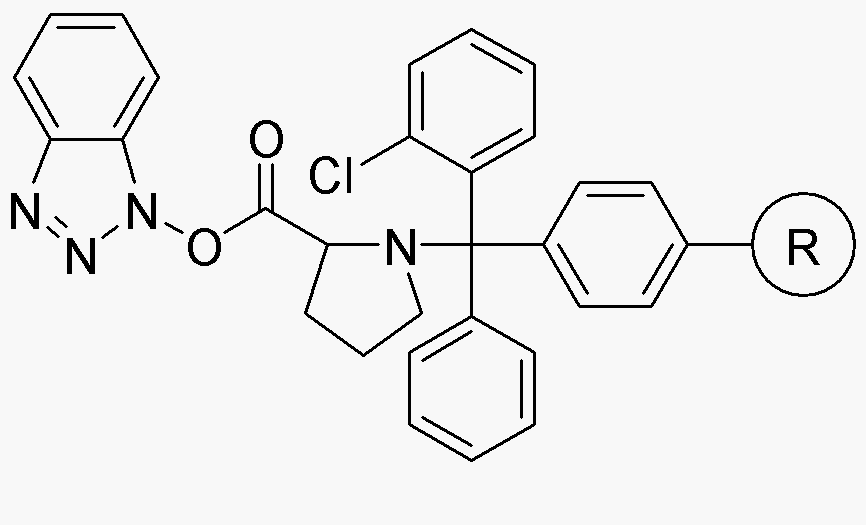N-(2-Chlorotrityl resin)-L-proline benzotriazolyl ester is widely utilized in research focused on
- Peptide Synthesis: This compound serves as a valuable building block in the synthesis of peptides, facilitating the formation of complex structures in pharmaceutical research.
- Drug Development: Its unique properties make it an effective intermediate in the development of novel drugs, particularly in targeting specific biological pathways.
- Bioconjugation: The compound is used for bioconjugation processes, allowing researchers to attach biomolecules to surfaces or other molecules, enhancing the functionality of drugs and diagnostics.
- Material Science: In material science, it can be utilized in the creation of specialized polymers with tailored properties, useful in coatings and adhesives.
- Research Applications: It is also employed in various research applications, including studies on enzyme activity and protein interactions, providing insights into biological mechanisms.
General Information
Properties
Safety and Regulations
Applications
N-(2-Chlorotrityl resin)-L-proline benzotriazolyl ester is widely utilized in research focused on
- Peptide Synthesis: This compound serves as a valuable building block in the synthesis of peptides, facilitating the formation of complex structures in pharmaceutical research.
- Drug Development: Its unique properties make it an effective intermediate in the development of novel drugs, particularly in targeting specific biological pathways.
- Bioconjugation: The compound is used for bioconjugation processes, allowing researchers to attach biomolecules to surfaces or other molecules, enhancing the functionality of drugs and diagnostics.
- Material Science: In material science, it can be utilized in the creation of specialized polymers with tailored properties, useful in coatings and adhesives.
- Research Applications: It is also employed in various research applications, including studies on enzyme activity and protein interactions, providing insights into biological mechanisms.
Documents
Safety Data Sheets (SDS)
The SDS provides comprehensive safety information on handling, storage, and disposal of the product.
Product Specification (PS)
The PS provides a comprehensive breakdown of the product’s properties, including chemical composition, physical state, purity, and storage requirements. It also details acceptable quality ranges and the product's intended applications.
Certificates of Analysis (COA)
Search for Certificates of Analysis (COA) by entering the products Lot Number. Lot and Batch Numbers can be found on a product’s label following the words ‘Lot’ or ‘Batch’.
*Catalog Number
*Lot Number
Certificates Of Origin (COO)
This COO confirms the country where the product was manufactured, and also details the materials and components used in it and whether it is derived from natural, synthetic, or other specific sources. This certificate may be required for customs, trade, and regulatory compliance.
*Catalog Number
*Lot Number
Safety Data Sheets (SDS)
The SDS provides comprehensive safety information on handling, storage, and disposal of the product.
DownloadProduct Specification (PS)
The PS provides a comprehensive breakdown of the product’s properties, including chemical composition, physical state, purity, and storage requirements. It also details acceptable quality ranges and the product's intended applications.
DownloadCertificates of Analysis (COA)
Search for Certificates of Analysis (COA) by entering the products Lot Number. Lot and Batch Numbers can be found on a product’s label following the words ‘Lot’ or ‘Batch’.
*Catalog Number
*Lot Number
Certificates Of Origin (COO)
This COO confirms the country where the product was manufactured, and also details the materials and components used in it and whether it is derived from natural, synthetic, or other specific sources. This certificate may be required for customs, trade, and regulatory compliance.


